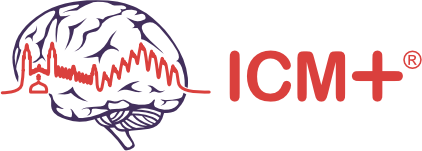3rd ICM+ Users' Meeting: Boston, MA, 2016
16th International Symposium on Intracranial Pressure and Neuro-Monitoring
Dr Peter Smielewski, director of the ICM+ project at the Brain Physics Laboratory, Cambridge, summarises the key aspects of ICM+, including some of the more advanced features, reflects on its impact in the neuro-monitoring field, and provides some insights into its future development:
Prof. Christina Haubrich discusses various approaches to monitoring of the autonomic system, focusing on relevant functions and charts available in ICM+:
Prof. Ken Brady from Texas Children's Hospital, Houston, talks about the importance of validation of new monitoring concepts and methodologies, autoregulation in particular, in controlled experimental settings:
Dr. Eric Schmidt, from the University Hospital in Toulouse, gives his views on the importance of investigation of CSF circulation dynamics in the elderly with dementia-like symptoms, and shows step by step how this can be achieved with ICM+:
Prof. Martin Schuhmann from the University Hospital in Tuebingen talks about his experience with managing children suffering from hydrocephalus, and in particular shows how ICM+ can be used in the diagnostic process:
Dr, Bernd Schmidt presents his non-invasive ICP plugin for ICM+, discusses its performance and shows some examples of use:
Prof Arminas Ragaus talk about auto-regulation monitoring projects in Vilnius and Kaunas University hospitals, in Lithuania
Prof. Bart Depreitere, the head of Neurosurgery at Leuven University Hospital, describes how he and his team manage to roll out and maintain ICM+ on a large number of ICU beds distributed over several units across a large hospital:
Mr. Manuel Cabeleira carries on to share our experience with using ICM+ for a high volume multicentre brain monitoring data collection project CENTER-TBI:
Prof. Charles Hogue delivers a highly-inspiring talk about his trial of autoregulation-based individualised ABP management for cardiac bypass patients:
Dr. Marcel Aries explains how to use ICM+ for the calculation of ‘Optimal CPP’ charts and real time trends:
Dr. Celeste Dias from Sao Jao Hospital in Porto, Portugal explains how she incorporated ‘Optimal CPP’ approach into her protocol for management of TBI patients:
Dr. Andrei Oshorov from the Burdenko Institute, Moscow shares his experience with using ‘Optimal CPP’ methodology in his clinical practice in TBI patients:
Dr. Christopher Rhee, from Houston, Texas, explains why measurement (and management) of Critical Closing Pressure (CrCP) makes more sense than ABP in preterm infants:
Mr. Manuel Cabeleira explains features in ICM+ created specifically to facilitate networked setup:

